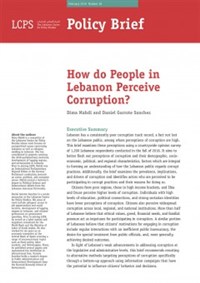-
PoliticsJan 02, 2019
ما هي تصورات الناس عن الفساد في لبنان؟
- ديما مهدي، دانيال غاروت سانشيز
 Lebanon has a consistently poor corruption track record, a fact not lost on the Lebanese public, among whom perceptions of corruption are high. This brief examines these perceptions using a countrywide opinion survey of 1,200 Lebanese respondents conducted in the fall of 2018. It aims to better flesh out perceptions of corruption and their demographic, socioeconomic, political, and regional characteristics, factors which are integral to forming an understanding of how the Lebanese public regards corrupt practices. Additionally, the brief examines the prevalence, implications, and drivers of corruption and identifies actors who are perceived to be participating in corrupt practices and their reasons for doing so.
Lebanon has a consistently poor corruption track record, a fact not lost on the Lebanese public, among whom perceptions of corruption are high. This brief examines these perceptions using a countrywide opinion survey of 1,200 Lebanese respondents conducted in the fall of 2018. It aims to better flesh out perceptions of corruption and their demographic, socioeconomic, political, and regional characteristics, factors which are integral to forming an understanding of how the Lebanese public regards corrupt practices. Additionally, the brief examines the prevalence, implications, and drivers of corruption and identifies actors who are perceived to be participating in corrupt practices and their reasons for doing so.
Citizens from poor regions, those in high income brackets, and Shia and Druze perceive higher levels of corruption. Individuals with high levels of education, political connections, and strong sectarian identities have lower perceptions of corruption. Citizens also perceive widespread corruption across local, regional, and national institutions. More than half of Lebanese believe that ethical values, greed, financial needs, and familial pressure act as impetuses for participating in corruption. A similar portion of Lebanese believe that citizens’ motivations for engaging in corruption include regular interactions with an inefficient public bureaucracy, the desire for special treatment from public officials, and, more generally, achieving desired outcomes.
In light of Lebanon's weak advancements in addressing corruption at the legislative and administrative levels, this brief recommends resorting to alternative methods targeting perceptions of corruption specifically through a bottom-up approach using information campaigns that have the potential to influence citizens’ behavior and decisions.ديما مهديباحثة سابقة في المركز اللبناني للدراسات حيث يترّكز عملها على القضايا الاجتماعية السياسية المتعلقة باللبنانيين واللاجئين المقيمين في لبنان. أجرت وساهمت في بحوث غطت الدروس المستفادة وطرق المضي قدماً بشأن النزوح الى لبنان؛ ّل السوري المطو البيئة السياسية المتعلقة بوجود النازحين السوريين في لبنان وتزايد الدعوات لعودة النازحين؛ الخاصة بالنازحين ّف آليات التكي السوريين؛ تصورات الفساد في القطاع العام اللبناني؛ وتنمية المناطق المتأخرة من خلال دراسة عوامل الاستقرار المؤسسي والاقتصادي والاجتماعي. حصلت على بكالوريوس في العلوم السياسية والشؤون الدولية من الجامعة اللبنانية الأميركية.دانيال غاروت سانشيزساهم دانيال غاروت سانشيز في هذا المشروع عندما كان باحثا ً أول في المركز اللبناني للدراسات. وهو يعمل حالياً كمستشار في شؤون سوق العمل لدى البنك الدولي. وتشمل مجالات عمله الهجرة الاقتصادية، وأسواق العمل، والمهام المطلوبة للوظائف، والصراع والتهجير القسري، وتنمية المناطق المتخافة. وقبل انضمامه إلى المركز اللبناني للدراسات، شغل منصب مستشار في هجرة اليد العاملة لدى البنك الدولي ووزارة العمل في المملكة العربية السعودية. وعمل ً لمدة ست سنوات كباحث اقتصادي في البنك المركزي الإسباني حيث كان أيضا يغطي مجموعة من موضوعات الاقتصاد الكلي مثل السياسة المالية، وأسواق العمل، وتقليص المديونية. حصل غاروت سانشيز على درجة الماجستير في الإدارة العامة والتنمية الدولية من كلية هارفارد كينيدي للإدارة الحكومية.